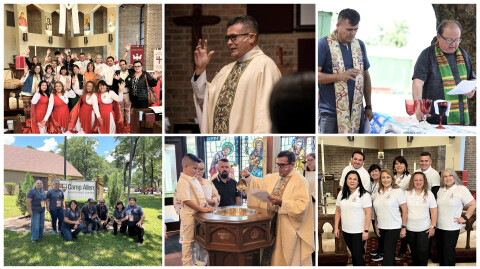This Just Isn't Fair...
This is the exclamation the older son makes in the parable of Luke 15:1-3, 11b-32. Our Thursday night small group has been reading Dr. Kenneth Baily’s “Jesus through Middle Eastern Eyes,” at exactly the same time I am reading his “Jacob and the Prodigal.” Bailey was a New Testament professor in the Middle East for over 50 years. I was blessed to take one of his courses in seminary and befriended him briefly after that. He has written at length about this profound parable only found in the Gospel of Luke. He died a few years back and I still miss his wisdom and gentle disposition.
All three parables in Luke 15 start with the same introduction, 15:1-3. The Pharisees and Scribes are upset that Jesus is eating with prostitutes, tax collectors, and other sinners. In Jewish Tradition, the type of guest you invite to dinner will either increase the honor and reputation of the host, or he/she will lead to dishonor. Few would invite thieves, prostitutes, tax collectors, or even shepherds to banquets. The Pharisees and Scribes are asking, “How can this man think of himself as a Rabbi and still eat with these kinds of people? What kind of an example is this Jesus setting for his followers?
Jesus responds by telling them three stories, all located in chapter 15. The story of the man who had two sons, also known as “The Prodigal Son,” is the third of these stories. Jesus said, "There was a man who had two sons. The younger of them said to his father, 'Father, give me the share of the property that will belong to me.'” This is a provocative opening for several reasons: First, as a younger son in this culture he is not entitled to inherit, unless it is the father’s will to leave him an inheritance. Asking for what “belongs to him” is presumptuous and it almost forces his father’s hand. In this culture this is seen as dishonorable. Second, inheritances are only given after the father has died. In a way he is saying, “Father, I can’t wait until you die, give me my money now!” This offends the father and the household.
Jesus continues, “So he divided his property between them. A few days later the younger son gathered all he had and traveled to a distant country, and there he squandered his property in dissolute living.” By now, the Pharisees and Scribes are beginning to think the father is crazy. Why else would he allow a portion of the land to be sold, and then allow his younger son to leave the village to go to a foreign territory with all his money? This is very strange. The anger of the Pharisee now would be directed at both the son and at the father. This kind of thing is not seen in their culture. The hearers would have expected the father to give the son a severe beating and expel him out of the village. But this is not what the old man does.
Jesus continues, “When he had spent everything, a severe famine took place throughout that country, and he began to be in need... He would gladly have filled himself with the pods that the pigs were eating.” This young man has turned away from everything: His father, his village, his land, and now, he even turns away from his religion. He has chosen to work with pigs, an expressly forbidden profession for Jews. He would even eat the food given to the pigs if he could. The Pharisees and Scribes would have approved of this outcome. The young man has reached rock bottom and he is rightly punished by God. If the story had ended here, the Pharisees and Scribes would have been exceedingly happy. The unrighteous man is punished by God for his unrighteousness and the insult to his father and community.
Jesus continues with a story of redemption and forgiveness the Pharisees and Scribes never expected. The young man “came to himself,” and devised a plan to restore his relationship with his father and to prevent starvation, “I will say to my father, ‘Father, I have sinned against heaven and before you; I am no longer worthy to be called your son; treat me like one of your hired hands."' Hired hands usually live in a village and get paid a daily wage. The Pharisees and Scribes would have expected the father to be extremely tough. Perhaps refuse to see his son, refuse to give him a job, get him expelled from the village. The son has insulted the family and the father has the right to avenge his honor. But this is not what happens.
“While the son was still far off, his father saw him and was filled with compassion; he ran and put his arms around him and kissed him.” He interrupts the son’s prepared speech and orders his servants to bring the best robe, give the boy a ring, kill the fatted calf, and prepare a banquet, “'For this son of mine was dead and is alive again; he was lost and is found!” I can picture the rage in the Pharisees and Scribes faces and can almost hear what they are saying, “This is just not fair! He should pay for his crimes. He does not deserve this royal treatment. He must pay it all back!” In fact, this is what the older son says, “Listen! For all these years I have been working like a slave for you... But when this son of yours came back, who has devoured your property with prostitutes, you killed the fatted calf for him!” This is how the Pharisees and the Scribes see themselves. They have followed the law and kept the commandments. They have kept themselves pure, not associating with sinners. They have done what God expected of them. The kingdom should be given to them, and it should not include any sinners. “It is just not fair!”
There is a subtle point of criticism Jesus is making. In Jewish tradition, it was the job of the older son to look for the younger son, to facilitate a reconciliation with the father, and to help the brother rehabilitate his standing in the community and repay his debt. The older son does not seek after the younger brother, he does not facilitate a relationship, he does nothing to bring the wayward son back into the fold. He has failed in his duties. He has been so concerned with the letter of the Law, that he forgets his duty as a brother and a son. The Pharisees and Scribes, likewise, have forgotten about the least and the lost among them. They have built walls of separation between them and “sinners” whom they no longer see as “brothers and sisters.” Like Cain, they failed to realize they are called to be “keepers” of their brothers and sisters. Jesus, on the other hand, acts like the true older brother. He seeks after the lost and gives up his life to find them and rescue them. He is the true older brother who restores a relationship between the lost sinners of the world and their Father. This is the truth of this story. Jesus eats and welcomes sinners because he has come into the world to save sinners, as we heard in John this last Sunday.
During this fourth week of Lent, I invite us to forego any judgement of others we do not see as holy enough, but to see ourselves as the younger brother in need of restoration. May we, forgiven younger brothers and sisters, become the good older brothers and sisters many in our community need, just as Jesus is our true older brother.
Blessings,
Fr. Roman+





